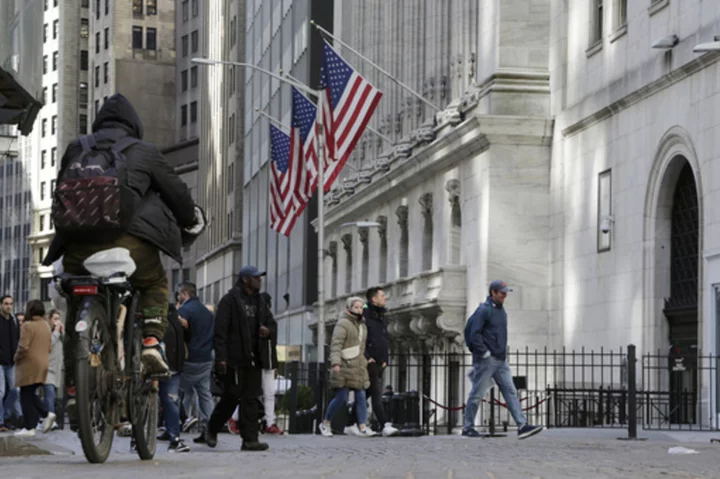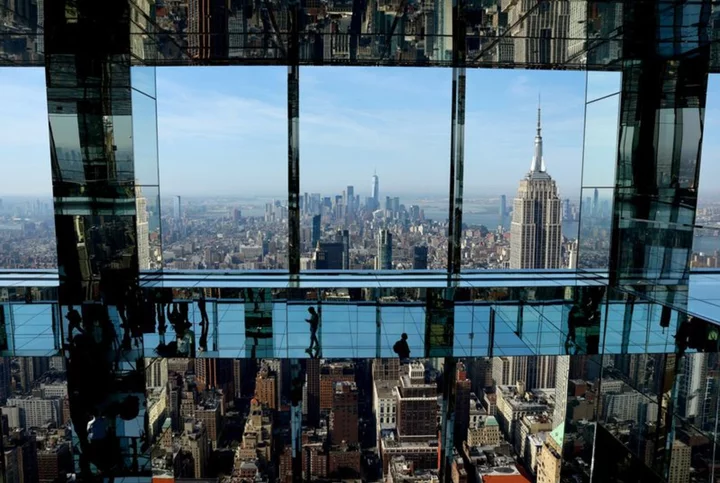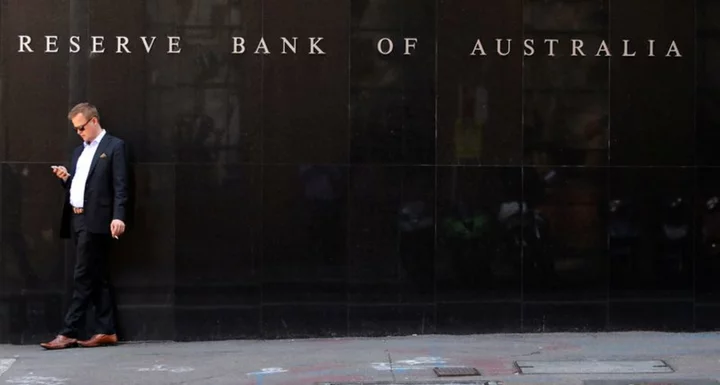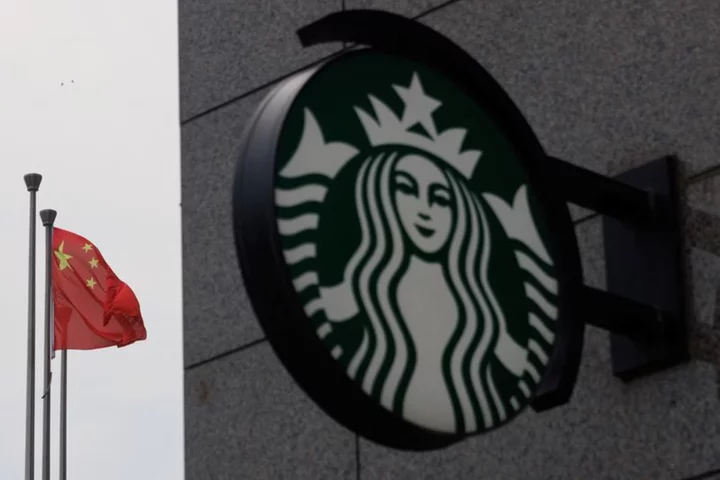NEW YORK (AP) — Wall Street is holding relatively steady coming off its worst week in nearly two months as stocks of several beaten-down banks rally. The S&P 500 and the Dow were little changed and the Nasdaq composite was barely lower early Monday. Besides a strong reading on U.S. jobs, which calmed worries about a recession but also raised concerns about inflation, last week was dominated by fears about smaller and mid-sized banks. PacWest Bancorp jumped 22% to recover some of its steep drop last week. PacWest said late Friday that it’s cutting its dividend to help build its financial strength.
THIS IS A BREAKING NEWS UPDATE. AP’s earlier story follows below.
Wall Street pointed higher early Monday as markets gear up for another busy week of earnings and two inflation reports from the U.S. government, all while monitoring the regional banking crisis.
Futures for the Dow Jones Industrial Average and futures for the S&P 500 each rose about 0.2% before the bell.
Companies this earnings season have largely reported better-than-expected results, injecting some optimism into what's been mostly gloomy economic outlook. Stubborn inflation, the war in Ukraine and the recent collapse of three regional banks have combined to paint a grim economic forecast, with many experts expecting a recession late this year or early next year.
Shares in PacWest Bancorp surged about 35% in premarket trading Monday, following Friday's gain of more than 80%. PacWest shares lost nearly half their value last week before Friday's turnaround as anxiety persists over the stability of smaller banks amid the Federal Reserve's cranking up of interest rates. Shares of Western Alliance, which also got pummeled last week, rose more than 15% before the bell.
PacWest share are still about 75% lower than they were before the bank collapses began in mid-March. Western Alliance shares are off about 64% in the same period.
Meat producer Tyson Foods, owner of the Jimmy Dean and Ball Park brands, posted its first quarterly loss since the Great Recession and its shares tumbled more than 9% in premarket trading Monday.
Also this week, PayPal, Under Armour, Rivian, Wendy's and The Walt Disney Co. are among the slew companies scheduled to report quarterly results.
On Wednesday, the government releases its monthly report on consumer inflation, followed Thursday by its report on inflation at the wholesale level. Both reports are closely monitored by analysts and investors, but more importantly by the Federal Reserve, which has been raising interest rates for more than a year to combat four-decade-high inflation.
A report Friday showed hiring accelerated across the economy by much more than expected last month. The government’s jobs report also showed workers won bigger pay raises than expected.
Such trends helped calm worries that a recession is looming, even as time grows short on reaching an agreement on the U.S. government debt ceiling, Stephen Innes of SPI Asset Management said in a commentary.
“But anxiety is building early this time and shifted into high gear last week after Secretary Yellen warned that a default could occur as soon as June 1,” he said.
Treasury Secretary Janet Yellen said Sunday that there are “no good options” for the United States to avoid an economic “calamity” if Congress fails to raise the nation’s borrowing limit of $31.381 trillion in the coming weeks.
The government would lack the funds to pay its obligations, she said in an interview on ABC’s “This Week,”
“And it’s widely agreed that financial and economic chaos would ensue," Yellen said.
She did not rule out President Joe Biden bypassing lawmakers and acting on his own to try to avert a first-ever federal default. If the government can’t borrow money to keep paying its bills for an extended period, there could be millions of job losses, businesses left bankrupt, crashes piling up across financial markets and lasting economic pain.
The strong U.S. employment data added to worries that persisting high inflation may push the Federal Reserve to raise interest rates further, adding to pressure on an already slowing economy.
The Fed said Wednesday it wasn’t sure of its next move after raising its benchmark rate to a range of 5% to 5.25%, up from virtually zero early last year. Many traders expect the Fed to hold rates steady at its next meeting in June, which would be the first time that’s happened in more than a year.
High interest rates have already caused cracks in the U.S. banking system. Last week, regulators seized First Republic Bank, which became the third large U.S. bank failure to hit since March.
The industry's turmoil has raised uncertainty, for if banks pull back on their lending, like rate increases that could further stifle the economy.
At midday in Europe, Germany’s DAX rose 0.2%, while the CAC 40 in Paris rose 0.3%. Markets in Britain were closed for a holiday.
On Monday in Tokyo, the Nikkei 225 shed 0.7% to 28,949.88.
Hong Kong’s Hang Seng index added 1.2% to 20,297.03 and the Shanghai Composite index surged 1.8% to 3,395.00. South Korea’s KOSPI climbed 0.5% to 2,513.21, while the S&P/ASX 200 gained 0.8% in Sydney to 7,276.50.
India’s Sensex gained 1.2% and Taiwan’s Taiex picked up 0.5%.
In other trading Monday, benchmark U.S. crude oil picked up $1.94 to $73.28 per barrel in electronic trading on the New York Mercantile Exchange. It jumped $2.78 on Friday to $71.34 per barrel.
Brent crude, the international pricing standard, added $1.83 to $77.13 per barrel.
The dollar rose to 135.16 Japanese yen from 134.88 yen. The euro climbed to $1.1036 from $1.1023.
Late Thursday, Apple was the latest company to post earnings that beat analyst forecasts. The most valuable stock on Wall Street rose nearly 5% Friday, helping to lift the S&P 500 1.8%. The Dow Jones industrials gained 1.7% and the Nasdaq composite index rallied 2.2%.
——
Kurtenbach reported from Bangkok; Ott reported from Silver Spring, Maryland.









